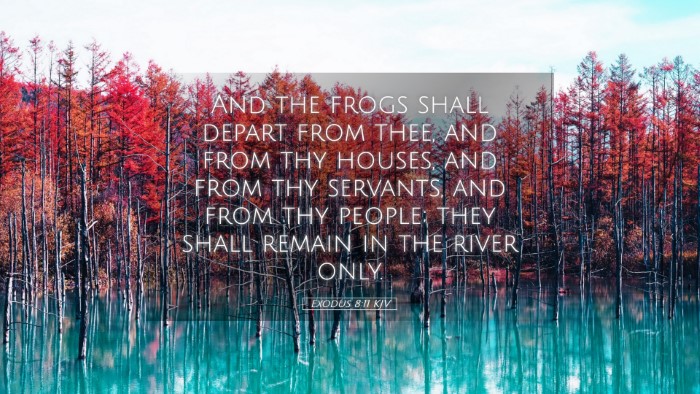Commentary on Exodus 8:11
Introduction
Exodus 8:11 presents a significant moment in the narrative of the Exodus, specifically within the context of the second plague in Egypt. The verse states: "And the frogs shall depart from thee, and from thy houses, and from thy servants, and from thy people; they shall remain in the river only." In this commentary, we explore the critical insights from the public domain commentaries, focusing on the theological, historical, and practical implications of this verse for pastors, students, theologians, and Bible scholars.
Contextual Background
The plagues in Egypt were divine acts aimed at demonstrating God's sovereignty over the false gods of Egypt and persuading Pharaoh to release the Israelites from bondage. The second plague, involving frogs, highlights God's power and the futility of Egyptian deities. The frogs, as instruments of judgment, forced the Egyptians to acknowledge the might and authority of the God of Israel.
Insights from Matthew Henry
Matthew Henry emphasizes the merciful aspect of the plague concerning the frogs. He notes that while the plague was a severe and uncomfortable judgment for Egypt, God's promise to remove the frogs illustrates His power combined with mercy. Henry indicates that Pharaoh’s heart becomes hardened even after experiencing great discomfort, leading to his ultimate refusal to let the Israelites go.
- The Nature of Divine Judgment: Henry points out that God's judgments serve to awaken the conscience. The overwhelming presence of frogs served as a reminder of Pharaoh's disobedience to God.
- The Purpose of Plagues: The plagues were intended not only to afflict but also to lead to repentance. The temporary cessation of the plague showcases God's willingness to respond to repentance, even in the heart of Pharaoh, although ultimately it was rejected.
Insights from Albert Barnes
Albert Barnes provides a detailed exposition regarding the significance of the frogs departing. He notes that the fulfillment of God's word serves as a testament to His sovereignty and reliability. Barnes highlights the structural significance of the departure of frogs, not merely as miraculous acts but as manifestations of divine authority over the natural order.
- Theological Significance: Barnes asserts that each detail is imbued with theological meaning, pointing to God’s authority over creation. The fact that frogs should leave the houses and cease to be a nuisance reflects a divine command over the very elements.
- Pharaoh's Response: He draws attention to Pharaoh’s promise to let the people go upon the cessation of the frogs. Barnes argues that such conditional promises are reflective of a heart that has not yet fully submitted to God’s will.
Insights from Adam Clarke
Adam Clarke offers a comprehensive theological discussion regarding the symbolism of frogs in this passage. He correlates the frogs to the idea of spiritual affliction and the need for purification. Clarke's commentary highlights the cultural significance of frogs in ancient Egypt, where they were considered sacred creatures.
- Symbolism of Cleanliness and Filth: Clarke elaborates on how the presence of frogs became a source of both disgust and spiritual symbolism. In the context of purity laws, the departure of impurities (the frogs) indicates divine cleansing and potential renewal.
- Lessons on Repentance: Clarke articulates that amidst the conviction and judgment, there exists an opportunity for repentance. He stresses the moral lessons that arise from the acknowledgement of sin and a desire to turn back to God.
Practical Implications for Ministry
This commentary on Exodus 8:11 imparts several key lessons that are applicable for contemporary ministry:
- God's Mercy in Judgment: Pastors and theologians can utilize this text to portray God's dual nature as both just and merciful. The message encompasses the reality of judgment but emphasizes the potential for mercy through repentance.
- Responding to Conviction: This verse serves as a reminder that personal and collective discomfort due to sin can lead to a heartfelt response to God. Churches should encourage their members to discern divine messages in their experiences and strive for genuine repentance.
- Authority of God’s Word: Acknowledging that God's promises are fulfilled can build faith in believers. Ministers should instill confidence in the congregation regarding God's sovereignty and reliability in His word.
Conclusion
Exodus 8:11, through the lens of these commentaries, reveals profound insights regarding God's judgment, mercy, and sovereignty. Pastors, scholars, and theologians can draw upon these reflections to deepen their understanding of Scripture and enrich their teaching. The departure of the frogs serves not only as a historical account but as an enduring lesson on the nature of repentance, the authority of God, and the ever-present possibility for spiritual renewal.


